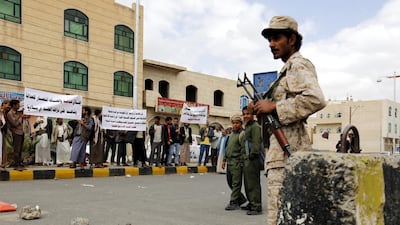Yemen’s Iran-backed Houthi rebels accused members of the Bahai community, who they deported last month, of being “fugitives”, members of the community said on Sunday.
The rebels released six members of the Bahai faith from prison last month, where UN human rights experts said they had been held as prisoners of conscience because of their beliefs.
The Bahai International Community called for the members' assets to be returned, for all charges against them to be dropped and for Bahais to be allowed to live in Yemen without persecution.
None of these demands have been met.
A Houthi court in Sanaa has requested that five of the released members attend a hearing scheduled for September 18.
The judge was apparently not aware that the members were deported from Sanaa, the spokesman of the Bahai community in Yemen, Abdullah Al Olufi told The National.
"There are no Bahai members held in Houthi prisons, originally 24 people where charged by a Houthi court, but only six were detained in Sanaa. The others have been charged but they are not in the capital and are all over the country," Mr Al Olufi said.
There are on going investigations to find the others but Mr Olufi hopes the rebels will drop the case.
"This shows the severity of persecution against the Bahais in Yemen," he said.
The Houthis said the members were “fleeing from justice”.
In a statement the Bahai International Community said it condemns the Houthi rebels' failure to drop the malicious charges that are driven by religious motives against the Bahais who they released and deported out of the country.
The representative of the Bahai International Community to the UN, Diane Alai, said the community was deeply concerned about these developments.
"All Bahais who have been taken out of prison are innocent and the charges against them are unfounded," Ms Alai said. "They must be dropped.
“They all love their homeland and do not want to leave it, but it has not left them with a safe and realistic option to stay."
The court session is a dangerous escalation against the Bahai community and more evidence of a "pattern of persecution" against the minority group, Ms Alai said.
For years, human rights advocates have decried unlawful incarceration of the Bahais and have demanded the minority be granted the right to practise its faith freely.
The Bahai faith originated in Iran in the 19th century and advocates universal peace and acceptance of all religions as manifestations of one deity.
Many of the 2,000 Bahai members living in Yemen reside in the Yemeni capital Sanaa, which was taken by Houthi rebels in 2014.
Since then, the group faced persecution by the militants, often on unsubstantiated charges of communicating with Israel.

